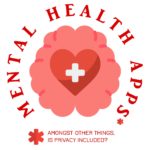Search Result
Mental health matters
Mental health apps
 Technology today gives you the ability to seek an extraordinary range of mental health support directly from your phone, some addressing specific needs. They provide access to more affordable and accessible therapists, offer research-backed strategies to help cope with everything from anxiety and depression to suicidal thoughts, OCD, and eating disorders, and help us meditate to calm down and reduce stress.
Technology today gives you the ability to seek an extraordinary range of mental health support directly from your phone, some addressing specific needs. They provide access to more affordable and accessible therapists, offer research-backed strategies to help cope with everything from anxiety and depression to suicidal thoughts, OCD, and eating disorders, and help us meditate to calm down and reduce stress.
Unfortunately, too often this comes at the cost of privacy. When choosing an app, be mindful that:
- They collect personal information about you
- Some use the information as a business asset to make money (selling to third-party advertisers, for example)
- Some don't always give users the option to access and delete the personal information they collect
- Many could make improvements to better secure and protect the information you share
According to the National Institute of Mental Health, these are the advantages and disadvantages of these apps:
Advantages
- Convenience: Treatment can take place anytime and anywhere and may be ideal for those who have trouble with in-person appointments.
- Anonymity: Clients can seek treatment options without involving other people.
- An introduction to care: Technology may be a good first step for those who have avoided mental health care in the past.
- Lower cost: Some apps are free or cost less than traditional care.
- Service to more people: Technology can help mental health providers offer treatment to people in remote areas or to many people in times of sudden need.
- Interest: Some technologies might be more appealing than traditional treatment methods, which may encourage clients to continue therapy.
- 24-hour service: Technology can provide round-the-clock monitoring or intervention support.
- Consistency: Technology can offer the same treatment programme to all users.
- Support: Technology can complement traditional therapy by extending an in-person session, reinforcing new skills, and providing support and monitoring.
- Objective data collection: Technology can quantitatively collect information such as location, movement, phone use, and other information.
Disadvantages
- Effectiveness: The biggest concern with technological interventions is obtaining scientific evidence that they work and that they work as well as traditional methods.
- For whom and for what: Another concern is understanding if apps work for all people and for all mental health conditions.
- Privacy: Apps deal with very sensitive personal information so app makers need to be able to guarantee privacy for app users.
- Guidance: There are no industry-wide standards to help consumers know if an app or other mobile technology is proven effective.
- Regulation: The question of who will or should regulate mental health technology and the data it generates needs to be answered.
- Overselling: There is some concern that if an app or programme promises more than it delivers, consumers may turn away from other, more effective therapies.
More
*privacy not included — Mental Health Apps Edition | Mozilla Foundation | May 2022
Young and depressed? Try Woebot! The rise of mental health chatbots in the US | The Guardian | 13 Apr 2022
Can an app improve NHS mental health support? | Imperial College London | 29 Jul 2021
Technology and the future of mental health treatment | National Institutes of Health | USA | Revised: Sep 2019
Mental health support directory | MEN R US
Mental health matters | MEN R US

